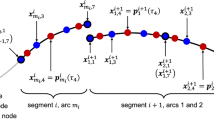Abstract
The space mission planning process is considered as a hybrid optimal control problem. Hybrid optimal control problems are problems that include categorical variables in the problem formulation. For example, an interplanetary trajectory may consist of a sequence of low thrust arcs, impulses and planetary flybys. However, for each choice of the structure of the mission, for example, for a particular choice of the number of planetary flybys to be used, there is a corresponding optimal trajectory. It is not a priori clear which structure will yield the most efficient mission. In this work we present a mathematical framework for describing such problems and solution methods for the hybrid optimal control problem based on evolutionary principles that have the potential for being a robust solver of such problems. As an example, the methods are used to find the optimal choice of three asteroids to visit in sequence, out of a set of eight candidate asteroids, in order to minimize the fuel required.
Similar content being viewed by others
References
Battin, R.H.: An Introduction to the Mathematics and Methods of Astrodynamics. AIAA (1987)
Buss, M., Hardt, M., von Stryk, O.: Numerical solution of hybrid optimal control problems with applications in robotics. Proc. 15th IFAC World Congress on Automatic Control, Barcelona (2002)
Carroll, D.L.: Fortran Genetic Algorithm (GA) Driver (1998). http://www.staff.uiuc.edu/~carroll/ga.html
Enright, P.J.: Optimal finite thrust spacecraft trajectories using direct transcription and nonlinear programming. Ph.D. Thesis, University of Illinois at Urbana-Champaign (1991)
Enright P.J., Conway B.A. (1991) Optimal finite-thrust spacecraft trajectories using collocation and non- linear programming. J. Guidance, Control Dynamics 14(5): 981–985
Enright P.J., Conway B.A. (1992) Discrete approximations to optimal trajectories using direct transcription and nonlinear programming. J. Guidance, Control, Dynamics 15(4): 994–1002
Gill, P. E., Murray, W., Saunders, M.A.: User’s Guide for SNOPT 5.3: A Fortran Package for Large-scale Nonlinear Programming. Stanford Univ., Stanford, CA (Jan. 1998)
Goldberg D. (1989) Genetic Algorithms in Search, Optimization and Machine Learning. Reading, MA, Addison-Wesley
Herman A.L., Conway B.A. (1996) Direct optimization using collocation based on high-order Gauss-Lobatto Quadrature Rules. J. Guidance, Control, Dynamics 19(3): 592–599
Ross I.M., Fahroo F. (2004) Pseudospectral knotting methods for solving optimal control problems. J. Guidance, Control, Dynamics 27(3): 397–405
Ross I.M., D’Souza C.N. (2005) A hybrid optimal control framework for mission planning. J. Guidance, Control, Dynamics 28(4): 686–697
von Stryk O., Glocker M. (2000) Decomposition of mixed-integer optimal control problems using branch and bound and sparse direct collocation. In: Engell S., Zaytoon J. (eds) Proc. 4th Int. Conf. on Automation of Mixed Processes: Hybrid Dynamic Systems, Dortmund, pp. 99–104
von Stryk O., Glocker M. (2001) Numerical mixed-integer optimal control and motorized traveling salesman problems. Eur. J. Control 35(4): 519–533
Author information
Authors and Affiliations
Corresponding author
Rights and permissions
About this article
Cite this article
Conway, B.A., Chilan, C.M. & Wall, B.J. Evolutionary principles applied to mission planning problems. Celestial Mech Dyn Astr 97, 73–86 (2007). https://doi.org/10.1007/s10569-006-9052-7
Received:
Accepted:
Published:
Issue Date:
DOI: https://doi.org/10.1007/s10569-006-9052-7




